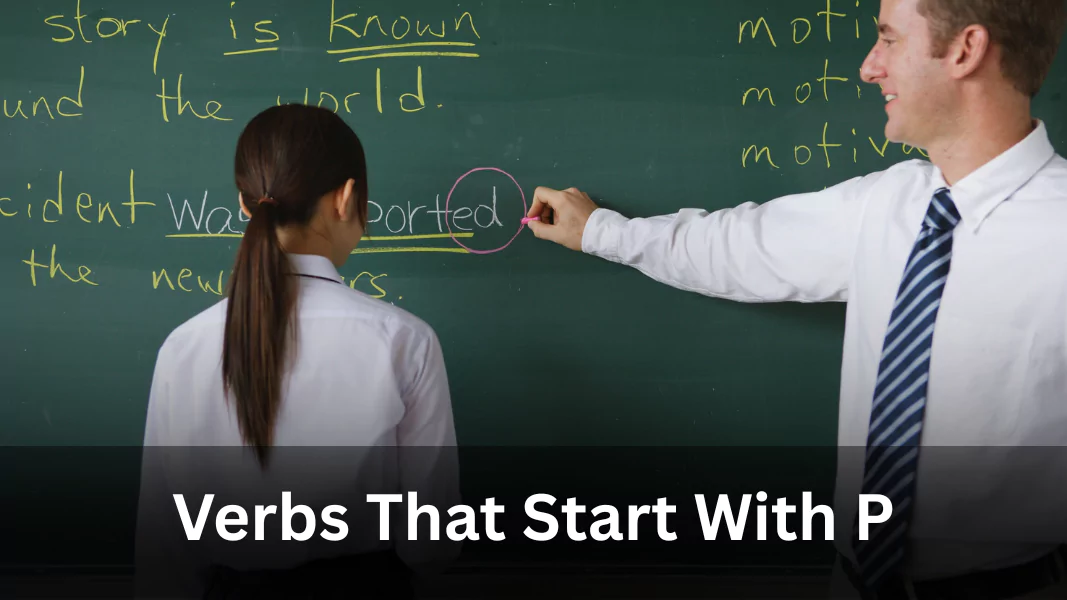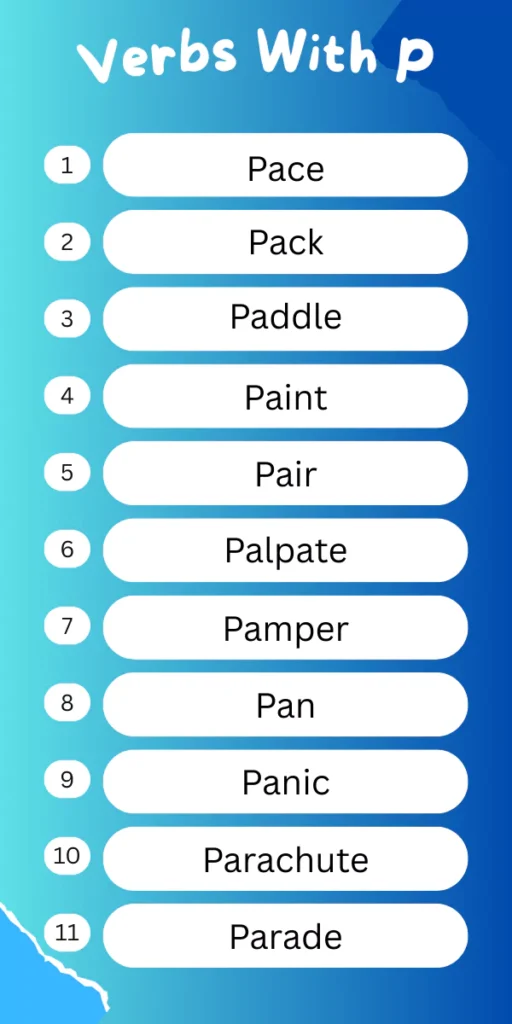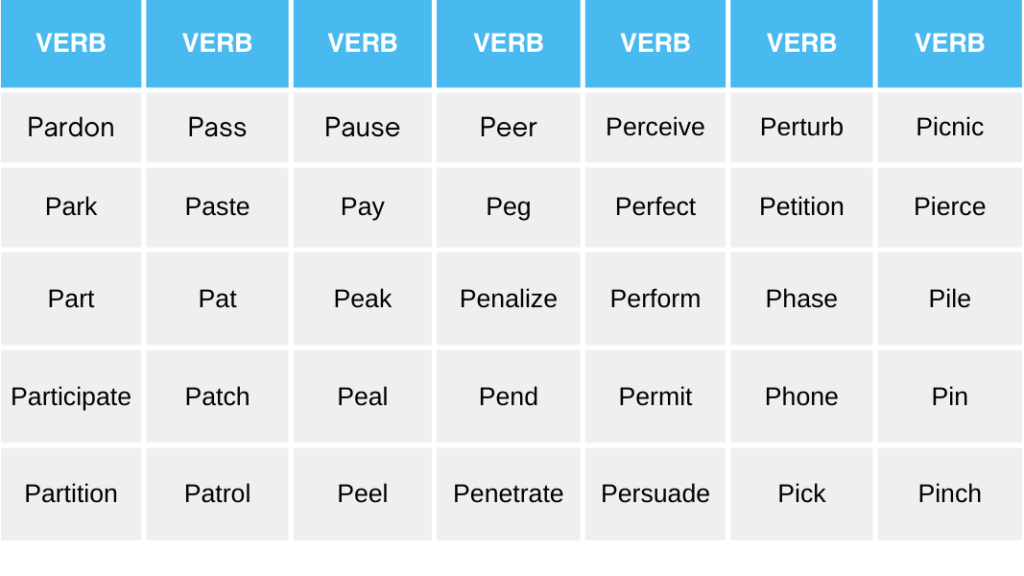Verbs That Start With P – Complete List With Meanings And Examples

When it comes to building a strong vocabulary, verbs are just as essential as nouns. Among them, verbs that start with the letter P stand out for their power, positivity, and productivity. From words like progress and persevere to protect and pioneer, these verbs carry an inspiring energy that can uplift both writing and conversation. Whether you’re a student searching for the right word, a writer polishing your craft, or simply someone looking to expand your vocabulary, exploring verbs that begin with P is a perfect way to strengthen your language skills.
List of Verbs That Start With P
The English language offers a wide variety of verbs beginning with the letter P, ranging from everyday actions like play and push to more dynamic and impactful choices such as promote, prosper, and pursue. These verbs not only help in expressing movement and intention but also add clarity, creativity, and motivation to communication. Below, you’ll find a comprehensive list of verbs that start with P to inspire your writing, speaking, and learning journey.

Common Verbs Starting With P
- Play – to engage in fun or recreational activity.
Example: The children love to play outside after school. - Put – to place something in a particular position.
Example: She put the book back on the shelf. - Pay – to give money for goods or services.
Example: He will pay the bill at the restaurant. - Pull – to draw something toward oneself.
Example: She had to pull the heavy door open. - Push – to apply force to move something forward.
Example: He had to push the cart up the hill. - Pick – to select or choose from a group.
Example: She will pick the ripest apple from the basket. - Pass – to move beyond a point or hand something to another.
Example: Please pass me the salt. - Plan – to decide on actions ahead of time.
Example: They plan their vacation every summer. - Provide – to give or supply something.
Example: The school will provide free lunches to students. - Prove – to demonstrate truth or existence.
Example: He worked hard to prove his skills. - Promise – to assure someone of doing something.
Example: She made a promise to always support him. - Protect – to keep safe from harm or danger.
Example: Parents protect their children from risks. - Place – to put something in a particular location.
Example: She carefully placed the vase on the table. - Practice – to repeatedly perform for improvement.
Example: He needs to practice his guitar skills daily. - Print – to produce text or images on paper.
Example: They will print the report for the meeting.
Positive Verbs Starting With P
| Verb | Meaning | Example |
|---|---|---|
| Prosper | to succeed or flourish | The business began to prosper after years of effort. |
| Progress | to move forward or advance | She is making great progress in her studies. |
| Persevere | to continue despite difficulties | He chose to persevere through tough times. |
| Promote | to support or advance something | The company will promote healthy work culture. |
| Praise | to express approval or admiration | The teacher praised the students for their hard work. |
| Participate | to take part in an activity | She decided to participate in the competition. |
| Pioneer | to be the first to develop or explore | He helped pioneer a new approach to technology. |
| Persuade | to convince someone through reasoning | She persuaded him to join the project. |
| Pacify | to calm or bring peace | The mother pacified her crying child. |
| Purify | to make clean or free from impurities | The filter helps purify the water. |
| Perfect | to make something flawless | She worked to perfect her craft. |
| Prevail | to win or succeed in the end | Justice will ultimately prevail. |
| Partner | to join with others for a purpose | The company partnered with a charity for donations. |
| Preserve | to maintain and protect something | They preserve old traditions through festivals. |
| Prepare | to make ready for something | He prepared well for the exam. |
Action Verbs Starting With P
- Punch – to strike with a fist.
Example: He punched the bag during training. - Push – to move something forward with force.
Example: She pushed the chair closer to the desk. - Pull – to drag or move something toward oneself.
Example: They pulled the rope together. - Plunge – to jump or dive quickly.
Example: He plunged into the swimming pool. - Paddle – to move through water using a paddle.
Example: They paddled across the river in a canoe. - Pat – to touch lightly with the hand.
Example: She patted the dog on its head. - Paint – to apply color to a surface.
Example: He painted the wall blue. - Polish – to make smooth and shiny.
Example: She polished the silverware before dinner. - Pack – to fill a container or suitcase with items.
Example: He packed his clothes for the trip. - Plant – to put seeds or plants in the ground.
Example: They planted flowers in the garden. - Pour – to cause liquid to flow from one container to another.
Example: She poured juice into the glass. - Peel – to remove the outer covering.
Example: He peeled the banana before eating. - Patrol – to watch or guard an area.
Example: The soldiers patrolled the border. - Pursue – to chase or follow.
Example: She pursued her dream of becoming a doctor. - Perform – to carry out or execute an action.
Example: The singer performed beautifully on stage.
Regular Verbs That Start With P
- Pack – Packed – to put things into a bag or container.
Example: He packed his lunch before leaving. - Paint – Painted – to cover a surface with color.
Example: They painted the fence white. - Play – Played – to engage in a game or activity.
Example: The children played soccer in the park. - Plan – Planned – to organize in advance.
Example: She planned a surprise party for her friend. - Plant – Planted – to place seeds in the soil.
Example: We planted roses in the garden. - Polish – Polished – to make something shine.
Example: He polished his shoes for the interview. - Practice – Practiced – to perform regularly for improvement.
Example: She practiced piano every evening. - Pull – Pulled – to drag something toward oneself.
Example: They pulled the sled up the hill. - Push – Pushed – to apply force forward.
Example: He pushed the stroller along the path. - Pick – Picked – to select or choose.
Example: She picked her favorite dress for the party. - Pat – Patted – to lightly touch or tap.
Example: She patted the baby on the back. - Pour – Poured – to transfer liquid.
Example: He poured coffee into the mug. - Peel – Peeled – to strip off an outer layer.
Example: She peeled the orange before eating. - Pack – Packed – to load items for storage or travel.
Example: We packed the car before the trip. - Print – Printed – to produce text or images on paper.
Example: The office printed the documents for the meeting.
Irregular Verbs Starting With P
- Pay – Paid – Paid – to give money for something.
Example: She paid the bill before leaving. - Put – Put – Put – to place something somewhere.
Example: He put his keys on the table. - Prove – Proved – Proven/Proved – to demonstrate truth.
Example: He proved his point with evidence. - Plead – Pled/Pleaded – Pled/Pleaded – to beg or make a case.
Example: The lawyer pleaded for mercy. - Prevail – Prevailed – Prevailed (semi-irregular; vowel sound shifts slightly).
Example: Truth always prevailed in the end. - Partake – Partook – Partaken – to join in or participate.
Example: They partook in the feast gladly. - Proofread – Proofread – Proofread – to check written text for errors.
Example: She proofread the essay carefully. - Preset – Preset – Preset – to set in advance.
Example: He preset the alarm for 6 a.m. - Proof – Proofed/Proved – Proofed/Proved – to test or make resistant.
Example: The baker proofed the dough overnight. - Ping – Pang/Pung – Pung (rare irregular form, though often regularized).
Example: The bell pinged when struck. - Price – Priced/Priced (semi-irregular in pronunciation) – to assign cost.
Example: The shop priced the new items today. - Pen – Penned/Pent – Penned/Pent (rare irregular).
Example: He pent his emotions in writing. - Ply – Plied – Plied (slightly irregular in spelling shift).
Example: The merchant plied his trade daily. - Perplex – Perplexed – Perplexed (archaically had “perplex” as irregular).
Example: The puzzle perplexed the students. - Partake – Partook – Partaken – (listed for emphasis since unique use in English).
Example: She partook in the ceremony.
Phrasal Verbs Starting With P
| Verb | Meaning | Example |
|---|---|---|
| Pick up | to collect or learn | He picked up the parcel from the office. |
| Put off | to delay or postpone | The meeting was put off until Monday. |
| Pass out | to faint or distribute | She passed out during the heat. |
| Put up with | to tolerate | He can’t put up with the noise anymore. |
| Pull over | to stop a vehicle at the side of the road | The police asked him to pull over. |
| Point out | to indicate something | She pointed out the mistake in the report. |
| Put down | to insult or write something | He put down his thoughts in a journal. |
| Play along | to pretend agreement | She played along with the joke. |
| Pay back | to return borrowed money | He paid back the loan on time. |
| Push ahead | to continue with determination | They pushed ahead with their plans despite difficulties. |
| Pull together | to cooperate | The team pulled together to finish the project. |
| Put out | to extinguish or inconvenience | Firefighters put out the flames quickly. |
| Pick on | to bully or criticize unfairly | He was picked on at school. |
| Pass on | to transfer or die | She passed on the message to her friend. |
| Put across | to explain clearly | The teacher put across the concept very well. |
Rare and Unique Verbs Starting With P
- Peregrinate – to travel or wander.
Example: They peregrinated across Europe for months. - Pontificate – to speak pompously.
Example: He pontificated on matters he barely understood. - Pander – to gratify weaknesses or desires.
Example: The show panders to popular tastes. - Pummel – to strike repeatedly.
Example: The boxer pummeled his opponent. - Parley – to negotiate or discuss terms.
Example: The leaders parleyed before the battle. - Pillage – to loot or plunder violently.
Example: The soldiers pillaged the town. - Petrify – to stun with fear or turn to stone.
Example: She was petrified by the horror movie. - Prevaricate – to avoid telling the truth.
Example: The politician prevaricated during the interview. - Propitiate – to appease or gain favor.
Example: The villagers offered sacrifices to propitiate the gods. - Purl – to knit with loops or ripple.
Example: She purled stitches in her knitting project. - Plait – to braid.
Example: She plaited her daughter’s hair neatly. - Palliate – to ease symptoms without curing.
Example: The medicine palliates the pain temporarily. - Peregrinate – (listed again, very rare) – to journey abroad.
Example: They peregrinated the countryside in search of peace. - Parboil – to partially cook by boiling.
Example: She parboiled the vegetables before roasting. - Pulverize – to crush into powder.
Example: The machine pulverized the rocks into dust.

Popular & Impactful Verbs That Start With P
| Verb | Meaning | Example |
|---|---|---|
| Progress | to advance or move forward | She is progressing well in her studies. |
| Prosper | to flourish or succeed | The family business prospered over time. |
| Promote | to support, advance, or raise in position | The campaign promotes healthy living. |
| Protect | to guard from harm | The law protects citizens’ rights. |
| Pioneer | to lead the way in innovation | He pioneered modern computing methods. |
| Persuade | to convince through reasoning | She persuaded her parents to agree. |
| Partner | to collaborate with | They partnered with a charity for good causes. |
| Provide | to give or make available | The teacher provided notes to the students. |
| Prepare | to get ready | He prepared for the presentation all night. |
| Perform | to carry out or showcase skill | The band performed wonderfully. |
| Publish | to make public or release | The author published her first novel. |
| Prioritize | to arrange in order of importance | She prioritized her tasks effectively. |
| Pursue | to chase after goals | He pursued a career in medicine. |
| Perfect | to improve to excellence | The chef perfected his recipe over years. |
| Prevail | to triumph or overcome | In the end, truth prevailed over lies. |
Fun Facts About Words Beginning With P
- P is the 16th Letter With Powerful Prefixes – The letter P stands as the 16th in the English alphabet and is often used in prefixes like pre-, pro-, and post-. These prefixes drastically change meanings: predict (to foretell), progress (to move forward), and postpone (to delay). That makes P a true “power-starter” in English.
- Silent P is More Common Than You Think – Many P-words have a silent P at the beginning, often paired with “s” or “n.” Examples include pneumonia, psychology, and psalm. This silent P originates from Greek words, where the P was once pronounced but later dropped in English.
- P is a Popular Starter for Positive Words – A large number of uplifting and motivational verbs begin with P, such as prosper, progress, persevere, and protect. This makes P one of the most commonly used letters in motivational speeches, writing, and branding.
- P Can Sound Like F in Some Words – Interestingly, some P-words in English take on an “F” sound due to Greek influence. For example, philosophy, photography, and phantom. The “ph” digraph represents the Greek letter “phi,” which had a breathy sound similar to F.
- P Has Ancient Symbolic Roots – The letter P comes from the Greek letter “pi (Π, π)”, which itself derived from the Phoenician letter “pe”, meaning “mouth.” That’s fitting, since many powerful P-words (proclaim, pronounce, preach) deal with speaking or expressing.
FAQs
Conclusion
Verbs beginning with the letter P bring a sense of power, positivity, and purpose to the English language. From common choices like play and push to motivational ones such as prosper, progress, and persevere, these words show just how versatile and impactful P-verbs can be. Whether you’re a student improving vocabulary, a writer enhancing expression, or a language enthusiast expanding word knowledge, exploring verbs that start with P can boost your communication skills and creativity.
